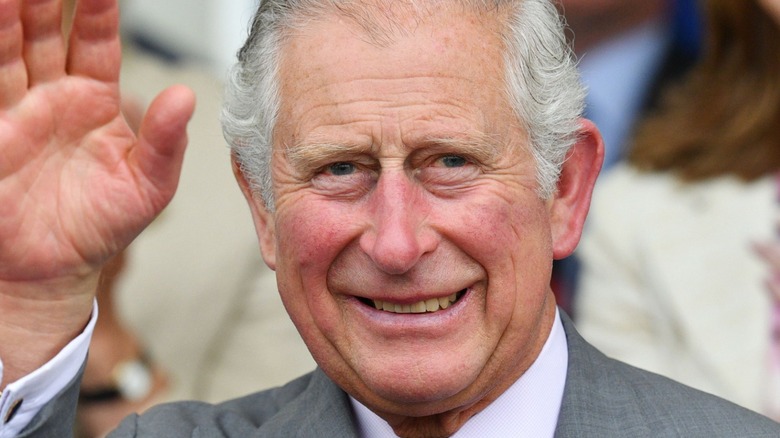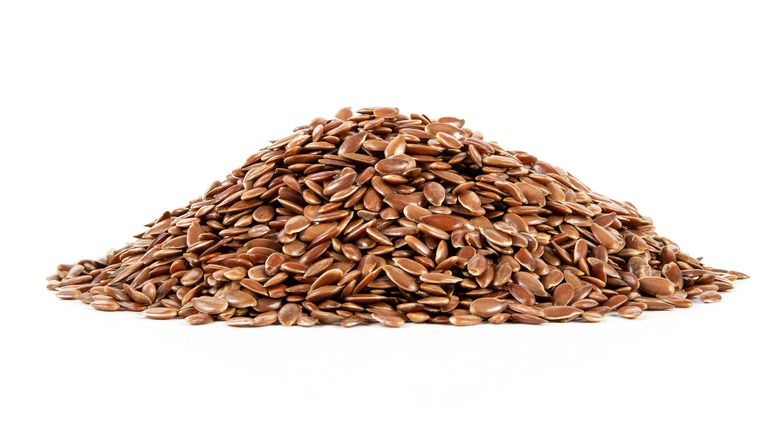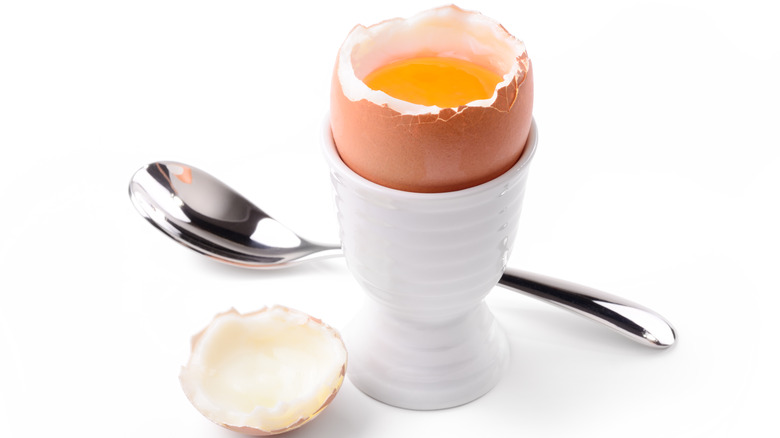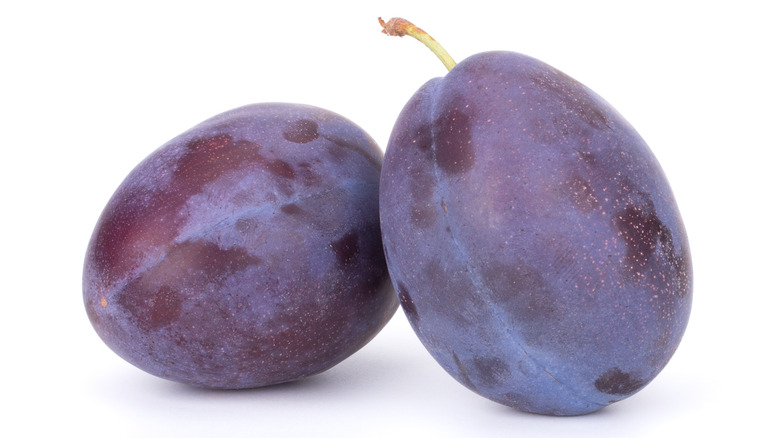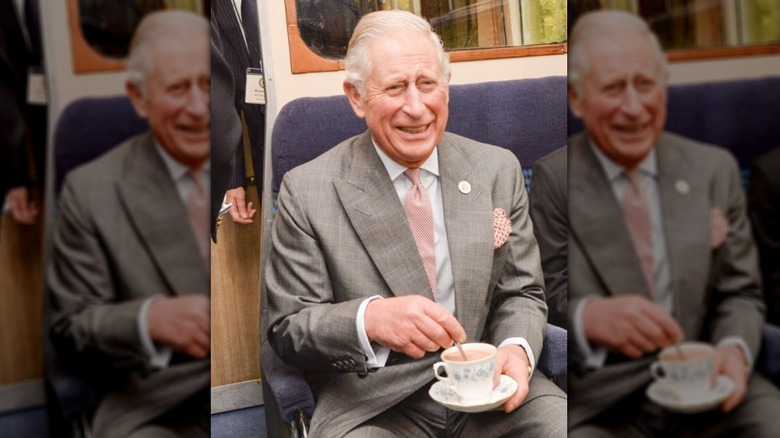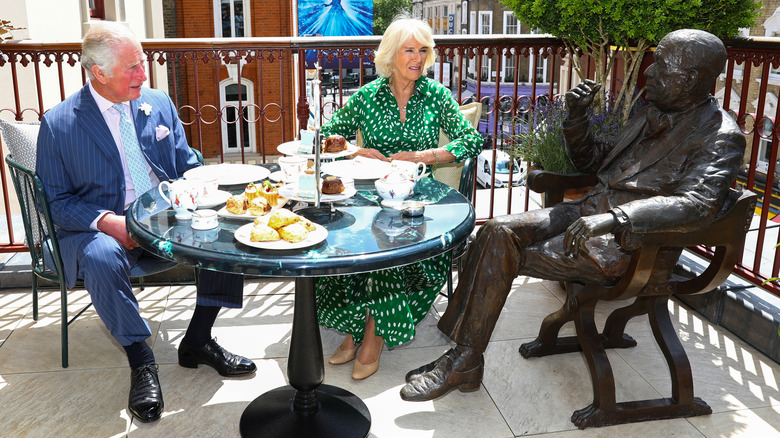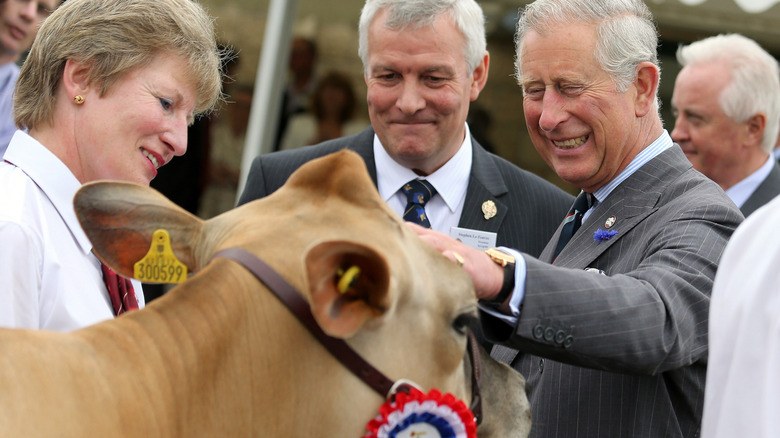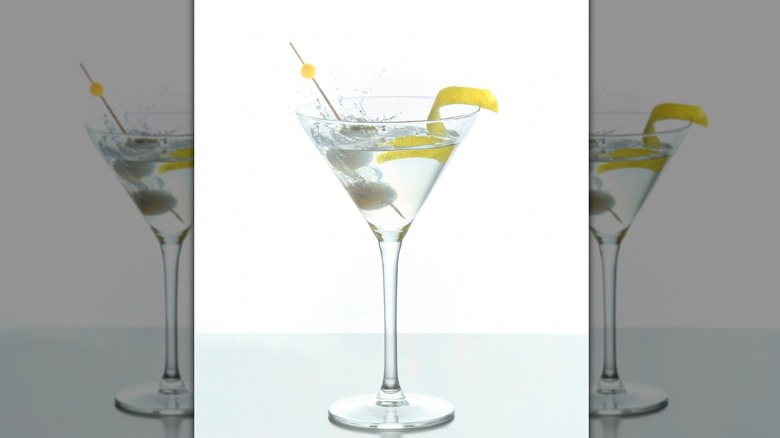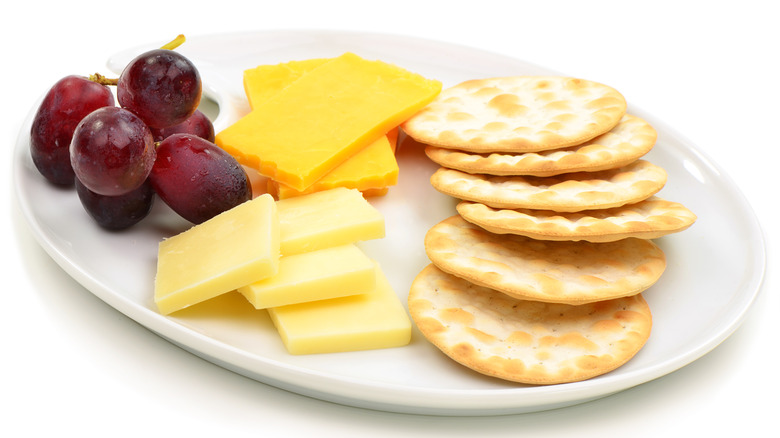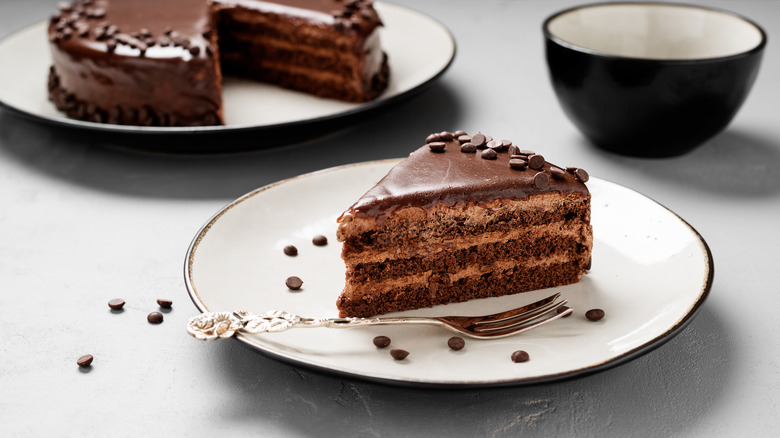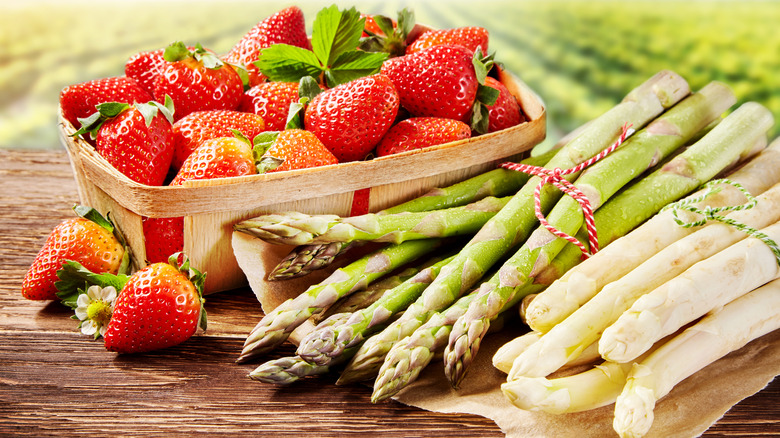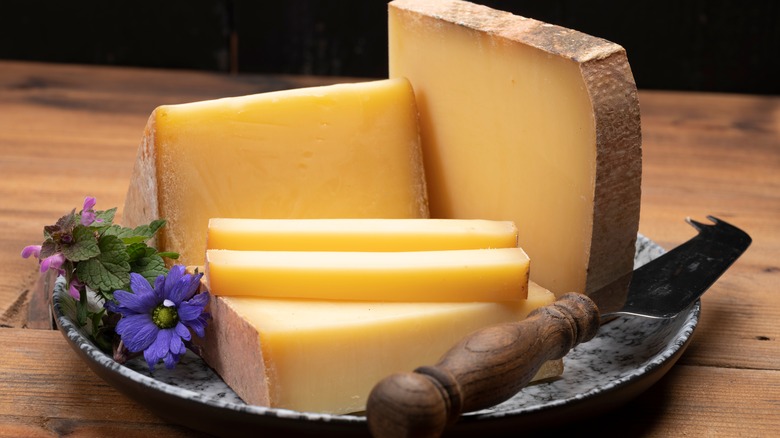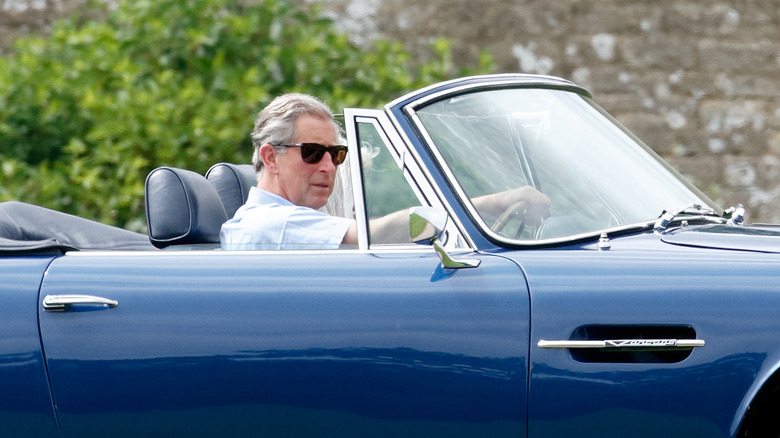12 Unusual Food Habits Of King Charles
When we speak of "eating like a king," we generally have in mind a pretty elaborate spread, most likely one involving lark's tongues in aspic, whole roasted boar's heads, and perhaps even four-and-20 blackbirds baked in a pie. If the kings in question reigned centuries ago, then they may well have indulged in such extravagant delicacies, at least upon occasions of state. King Charles, however, is a very modern monarch, so he adheres to quite a different menu.
For one thing, the king is a dedicated environmentalist, so you'll certainly never see him condoning animal abuse in the form of live-baked birds and he's already banned foie gras from the palace due to the fact that it's produced by cruel force-feeding. While King Charles does not adhere to a vegan diet, he's certainly plant-based food-friendly, as well. He does have his own special food quirks, as do we all, but many of these actually make him seem pretty relatable rather than being the type of monarch who'd say of the masses, "Let them eat cake." (He'd probably rather we were all noshing on healthy organic produce, anyway.)
He likes to start his day with seeds
While a full English breakfast may include generous helpings of such hearty fare as eggs, bacon, sausage, baked beans, and fried bread, this is not how the King of England starts his day. (To be honest, we doubt that many of his subjects eat it on an everyday basis, either.) So what does the king eat, then? According to Tina Brown, author of "The Palace Papers," he typically breakfasts on fresh fruit and what the family jokingly refers to as "bird seed." In fact, one time Prince William told a guest who'd opened a tureen, only to find it filled with the king's favorite linseed, "Oh no, don't go near the bird table, Stephen, that's only for Pa."
So dedicated is King Charles to the idea of beginning his day in a healthy way that he even has a special breakfast box that he takes with him when he travels. That way, he needs never resort to stopping off at Dunkin' for a donut and a cup of coffee. Instead, one-time palace chef Graham Newbould says that the king brings along muesli (presumably heavy on the seeds), dried fruit, and six different types of honey, (via YouTube). While half a dozen kinds of honey may seem slightly excessive, it's pretty insignificant as royal indulgences go and not likely to get the British taxpayers in too much of an uproar.
There's some controversy about the way he does (or doesn't) eat his eggs
Something that did ruffle a few feathers is the issue of how fussy the king may be about his boiled eggs. A 2006 book called "On Royalty" by Jeremy Paxman, revealed to the world that the picky prince (as Charles was at the time) would have the royal chefs boil seven different eggs, of which he'd choose the one that he felt had a perfect consistency. The rest, presumably, were thrown away, which is a shocking example of food waste from a monarch with such a planet-friendly reputation.
The palace, of course, wasted no time in denying the allegations as they acknowledged that wasting six out of every seven eggs really didn't fit in with the then prince's public persona. The media did a little more digging, however, and it came out that Charles' egg-wasting ways had previously been documented in Wendy Berry's 1993 "The Housekeeper's Diary." In her tell-all tome, Berry gave a peek inside the palace kitchens. She explained that Charles was a stickler for three-minute eggs, so the chef would generally cook multiple batches to ensure that at least one of them pleased the royal palate. "The others," she says, "were simply thrown away." If that's true, it's pretty disappointing — why couldn't the kitchen have cooked the eggs a few minutes longer, then used them to make egg salad sandwiches for the staff?
He's particular about his plums
In addition to his "birdseed," King Charles also enjoys fruit for breakfast, especially canned plums in juice. He's very particular about exactly how he wants them served, though: two plums, no more, no less, with just a little bit of the juice. The kicker is, he only ever eats one of these plums and always sends the other one back.
Chef Darren McGrady, as per this YouTube documentary, did try to put a stop to this plum palavering by serving just a single piece of fruit, but the then-prince protested. He wanted that second plum, but once he got it, of course, he didn't eat it. At least McGrady didn't toss the returned plums into the trash, though, as he admitted to putting them right back in the jar. As long as the uneaten plums are being recycled in such a fashion, the king's insistence on having a pair every day is simply a harmless (if slightly bizarre) little ritual.
He takes his tea with milk and honey
How does the typical British tea drinker (which is to say, nearly everyone in the nation) take their tea? According to a YouGov survey, 85% like their cuppa with milk, while 26% take sugar — needless to say, there's some overlap here. King Charles, however, prefers a posher brew. As the then-Prince of Wales' website revealed just prior to his 70th birthday, he takes his tea (Darjeeling, for preference) with milk and honey. While this isn't very common, with YouGov reporting that only 7% of Britons sweeten their tea with anything other than sugar, it is very biblical.
What the king puts in his tea isn't the only thing that sets this meticulous monarch apart from the mob. Do you know those hipsters who are super specific about exactly how they like their pour-over coffee to be made? Well, that's pretty much King Charles in regard to his tea. Hello! says it can only be looseleaf, of course, and he's also very particular about the temperature of the water. If the tea is green, the water must be heated to exactly 70 C, while if it's Earl Grey instead, the water needs to be heated precisely to the boiling point (100 C).
He doesn't do lunch
You would think that after breakfasting meagerly on seeds and a single plum, the king would have a hearty appetite for lunch. Apparently, this is not the case, though, according to his former Prince of Wales website, he hardly ever eats a midday meal. What does the king have against lunch? It seems he feels it would be an interruption to his busy life as an extra hard-working royal. Even his staff don't get to take a lunch break, according to one-time press secretary Julian Payne. As Payne told The Mirror, he learned early on that it was a good idea to pack some snack bars for a mini-meal on the go when accompanying the future king on his rounds.
While the royals do not dine until 8:30 p.m., King Charles does not starve himself for quite that long. He and Camilla will typically have tea at 5 p.m., complete with cake and sandwiches. The cake is often a fruitcake (the British seem to have a higher tolerance level for this dessert), and none of it goes to waste as whatever isn't eaten will be on tomorrow's tea table, as well.
He calls his diet climatarian
First, there was the vegetarian diet, then we started hearing about pescatarian, flexitarian, etcetera. Well, leave it to King Charles to adopt yet another type of "tarianism": he proclaims himself to be a climatarian. A climatarian diet, as its name implies, is one that's meant to lessen the impact that food production has on the planet. Sustainable food sources are preferred, while produce that is either out of season or imported from afar is frowned upon.
The way that King Charles has structured his own diet in order to make it more environmentally friendly by eating vegan one day out of the week, while on two other days, he goes lacto-ovo-vegetarian. This means that while dairy and eggs are permitted, he will not eat any meat or fish at these times. According to The Express, the king feels that this diet will help to reduce his carbon footprint. He's also setting a good example of how we can all make positive changes even through moderate action — if a vegan diet does not appeal, you need not go whole hog (or rather, whole soy). As an alternative, you can simply cut back on the amount of meat you eat and instead make sure it's grass-fed and locally sourced, if possible. (And if it fits into your budget -– we don't all have a king's ransom at our disposal to pay our Whole Foods Market bill.)
He likes his martinis heavy on the vermouth
Some martini drinkers make a big fuss about how dry they like their cocktails to be. Some may want the bartender to do nothing more than whisper the word "vermouth" over a glass of gin, while former British Prime Minister Winston Churchill, in a similar vein, once stated, "I would like to observe the vermouth from across the room while I drink my martini." King Charles, on the other hand, has no fear of fortified wine.
While Spirits Beacon explains that a classic dry martini is made with a six-to-one ratio of gin to vermouth (so 3 ounces of the former to ½ ounce of the latter), the king's preferred martini is known as extra wet or 50/50, as it contains equal amounts of both spirits. So fond of his pre-dinner martinis is this monarch that he sometimes travels with a supply of pre-mixed ones. Tina Brown's "The Palace Papers" describes how he'd have one of his security guards serve him his drink out of his very own glass. Is the king just being picky here, or is he perhaps perturbed by the possibility of poison? Uneasy lies the head that wears the crown, after all, and you don't need to be a Shakespearean scholar to be aware that not all British monarchs peacefully pass away in their own beds at the age of 90+. It's enough to drive a man to indulge in a martini or two.
He prefers his crackers warmed
Oscar Wilde's 1887 short story "The Canterville Ghost" makes the observation that "We [the British people] really have everything in common with America nowadays, except, of course, language." If you ever travel across the pond or even spend any time reading British books or websites or watching British TV shows, you'll likely have already worked out that "chips" are really french fries, while "crisps" are actually chips, and "biscuits" are cookies. Or, according to Vox, they could also be crackers, since biscuits come in both sweet and savory (or "savoury") varieties. Why all this explanation? Well, you'll need it for context in order to realize why MyLondon considers King Charles' biscuit preference to be just bizarre.
Apparently, the king prefers to eat his biscuits warm, which would be not odd at all but actually quite normal and even preferable if they were the American kind. If they're cookies or crackers, particularly store-bought ones, then it may be slightly unusual, but "bizarre" is putting it pretty strongly. The Independent is far less judgmental but reports that a palace insider has confirmed that the staff does keep a warming pan on hand to heat up the king's biscuits. These are probably of the cracker kind, as he enjoys them with a side of cheese. Warm crackers with cheese actually sound rather nice, really, and we may well try microwaving our next handful of saltines.
He doesn't share his mother's passion for chocolate
Queen Elizabeth II was, rather endearingly, a major chocoholic. It seems that a love for chocolate may run in the family since Queen Mary (wife of King George V) also enjoyed the same chocolate birthday cake that was a Windsor family tradition for many decades. When the next royal birthday rolls around, however, there may be a different kind of cake underneath the candles. In a shocking break from tradition, King Charles (gasp!) doesn't care for chocolate.
Graham Tinsley MBE, who once helped plan menus for the then-Prince of Wales, told Hello!, in words too plain to misinterpret, "[King] Charles doesn't like chocolate," and said he'd needed to keep that in mind when deciding on the dessert course. It's not that the king doesn't like sweets, though; he's very much a fan. Not only does he use honey in his tea as previously discussed, but he has a favorite dessert of his own: lemon cream. The recipe, as per Fine Dining Lovers, was created by former royal chef Enrico Derflingher when the then-prince was painting in the Shetland Islands. This simple dessert was made from local sheep's milk, lemon juice, and sugar, then garnished with a biscuit on top (of the cookie variety, we're sure). This pudding made such a hit with the future king that Derflingher says he went on to make it many more times during his palace tenure.
He eschews out-of-season foods
As chef Enrico Derflingher told Fine Dining Lovers, he feels that King Charles may well have been the originator of "kilometre zero" or even "zero metres" dining due to the fact that he had vegetable patches at every palace to ensure that his produce was not trucked or flown in from miles away. Not only is the king dedicated to reducing his carbon footprint by eating locally-sourced foods, but the Defender of the Faith (one of his many titles) also adheres to the principle spelled out in the Bible's Book of Ecclesiastes, "To every thing there is a season."
What this means to the environmentally-minded monarch is that he simply won't eat foods that are out of season. Carolyn Robb, yet another chef who once worked for the former Prince of Wales, told The Sunday Times that produce such as asparagus would be in heavy rotation on the menu when it was growing in the garden, but serving it up in winter was a big no-no. We take it that King Charles is no fan of the frozen or canned kind, but then again, who is? Presumably, the palace gardens have winter squashes and other cold-weather vegetables to take the king through until spring.
He's a strong supporter of unpasteurized cheese
Not only is King Charles the Defender of the Faith, as per his coronation, but he's also the self-appointed Defender of British Cheese, especially those cheeses of the raw milk variety. Raw milk cheeses are ones made from unpasteurized milk, and if you've never tried one, this may be because they are only sold in the U.S. under strict regulations and in nearly half of the states they're not legal at all. This type of cheese is still quite common in Europe, however, although in the early '90s, there was some talk by various European countries of enacting a ban. The future king was loudly critical of this move, proclaiming, (via Deseret News), that "life was not worth living" without all of the "gloriously unhygienic things" such as unpasteurized cheese.
The BBC actually credits King Charles with saving the artisan cheese industry in Great Britain. When the government threatened regulations that might include barring the use of unpasteurized milk, the then-prince brokered a meeting between the cheesemakers and the Ministry of Agriculture. He convinced the two parties to work together to seek a compromise, and they managed to do so. Today, artisan cheese is thriving in Great Britain thanks to the king. During the pandemic, King Charles did his bit for the Specialty Cheesemongers Association (he's been a patron for the past 30 years) by giving them a shoutout on Instagram and even sharing a recipe for baked eggs with cheese.
He has a car fueled by wine and cheese
The most interesting food fact about King Charles doesn't involve anything he ingests himself, but rather, what his car ingests. He drives a vintage Aston Martin, a brand also favored by James Bond. While we wouldn't blame the king if he does a little daydreaming about being a secret agent with a license to kill, he doesn't feel as if he has a license to pollute. To ensure that he won't, he's had the car that People says he bought new in 1970 retrofitted to use biofuels instead of gasoline. Okay, but where does the food part come in? It's what makes up the fuel.
While the U.S. Department of Energy says that most ethanol comes from corn, the ethanols powering the king's car are nothing quite so common. Instead, they're made from unusable wine, as well as whey (a byproduct of the cheese-making process). While this is all very eco-friendly, it's also kind of funny, too, prompting Lord Snowdon to joke, "How does [former] Prince Charles drive his Aston Martin? Caerphilly." We wonder, as well, if the king has a chauffeur who doubles as a sommelier and what wines the car likes best to drink — chardonnay, perhaps, or maybe carburetor sauvignon, or a nice glass of riesling?
